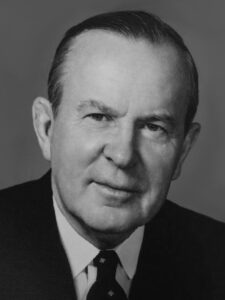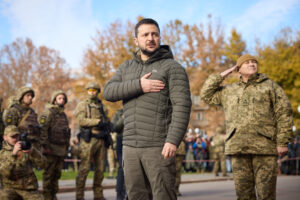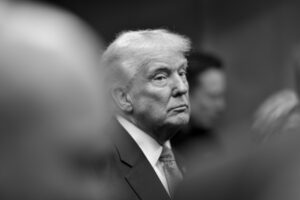This country has a chance to emerge as a global force simply by following in the footsteps of its Nobel Prize-winning prime minister Lester B. Pearson.
This is the perfect moment for a new Canadian government to play an invigorated and decisive role in the conduct of the world’s political and economic affairs. With dictators and wannabe dictators now ruling so much of the developed and much of the developing world, a morally charged, ideologically centered Canadian administration could help steady international affairs, dampen conflict and reassert the rule of law against unbridled attacks on sovereignty and constitutionalism.
Canada may have suffered from fiscal and other policy misjudgments. But now, in a contemporary world beset with violence and human rights’ abuses, Canada can stride the high road and demonstrate how one formidable middle power can exert a moral influence in the international arena. Canada should step up to restore sanity to the world.

With U.S. President Donald Trump’s foreign policy initiatives creating chaos daily, and with the United States consequently losing stature and respect across the globe, Canada should become the “sensible,” sane, North American power and rise internationally above its middle ranking in world affairs. Given Trump’s promotion of bad ideas such as the expulsion of Gazans from the strip, clamping and then removing heavy tariffs on Canada and Mexico, threatening Europe with much of the same, pulling critical monetary backing from the Haiti anti-gang mission, installing an unqualified intelligence czarina and refusing to restrain Russian President Putin from continuing to bomb Ukraine, there is now abundant room for Canada to return itself to the expression of a modernized Pearsonian moral leadership.

Prime Minister and Nobel Peace Prize laureate Lester B. Pearson, coming from a stern Methodist household, catapulted Canada to international prominence in the 1950s and 1960s by insisting that there were right and wrong answers to problems between nations. Given Trump’s entirely transactional and amoral approach to the calamitous problems of the world, one of the incoming Liberal or Conservative leaders of Canada could shine a bright light on principle, rather than expediency, if she or he emerged as an advocate of integrity and honesty in contrast to the shambolic political huckstering that Trump is about. The contrast between a newly assertive Canada and foolish United States would be stark and much welcomed by a 21st century world of nations looking for guidance, not gun fights and personal attacks.
Former prime minister Justin Trudeau briefly held off Trump’s tariffs by smartly inventing a new way to patrol the common border — the longest between two friends or enemies in the world — and by threatening retaliatory imposts that would cause prices to rise in the United States. After all, Canada and U.S. are each other’s largest trading partner; punishing your friends makes no economic or political sense. Some $3.6 billion worth of goods is traded across the common border every day. That’s $1.3 trillion a year. Half of the U.S.’s oil imports come from Alberta. Quebec and Ontario hydropower lights all of New England. And then there is the Canadian potash, uranium and other metals that the U.S. receives. Trudeau was wise to placate Trump and stall him probably for more than the 30-day pause period. It is also true that the U.S. relies on Canada much more than Trump is aware.
Trudeau did not publicly object to or interrogate Trump’s reprehensible methods. Pearson, in a similar situation, might have questioned the ethics and idiocy of picking a fight with one’s friendliest and most supportive neighbour. He would have denounced messing with legal agreements and treaties between two nations that have long seen eye to eye and that share something Trump hardly appreciates — a strategic and insecure Arctic region.
Nor has Trump appreciated that as much as he may hanker after Greenland because of its rich mineral resources, Greenland is in Canada’s backyard, and more important to Canada’s line of defence than to the U.S.’s. North America should be considered as one joint land mass worth defending by Washington and Ottawa in unison. Pearson understood, when Canada was less peopled and less prominent than it is now, that the advance of prosperity and the protection of the peoples of both countries were mutual objectives that both North American nations shared. One could not gain if the other lost.

Under Prime Minister Mark Carney, Canada needs to stiffen its shoulders and begin to play a more prominent role in NATO. That will mean spending more on defence generally, but particularly on putting more Coast Guard icebreakers into service to guard the Northwest Passage in order to secure North America and keep a close eye on Russian and Chinese manoeuverings. The early warning sentinels in Northern Canada require refurbishing. But, most of all, Canada needs to play a more decisive role in NATO, and in support of Ukraine’s war effort. Since Trump is likely abandoning Ukraine and undercutting NATO, there is a role in the defence of the world that Pearson would have appreciated. Canada could influence the manner in which decisions about Ukraine are made and even begin to reinforce existing troop detachments there. But, as Pearson would easily have understood, there are ways to provide moral clarity on behalf of a re-energized, re-internationalized, Canada.

The Trump-imperiled world needs a strong voice for ethical behaviour that Canada could now supply. Canada could raise its voice on behalf of Gazans and against ethnic cleansing. It could voice support for Panama and the sanctity of international treaties. It could, echoing Pearson, show that the fate of the world’s poor mattered, and that human rights cannot just be discarded.
Canada could affirm its support for the Paris Agreement on Climate Change, and for the reality of global warming and the requirement that the nations of the world continue to reduce CO2 transmissions, plus methane. It could reiterate its support for the World Health Organization, also under siege from Trump.
Given Trump and Elon Musk’s destruction of U. S. foreign assistance efforts, a newly vigorous Canada could help pick up some of the slack. It could articulate a desire to replace some of what Trump has discarded: food assistance in the developing world, especially Africa, technical training, democracy support, water improvements, HIV-AIDS drugs and much more. Canada may not have the financial resources available to the U.S., but it could take on some of the burden that the Trump administration is dropping.

By so doing, Canada could add to its quiet reputation for soft power. Pearson would have liked that, for he raised Canada’s stature in the world by clearly articulating the need for integrity and clarity in dealings among nations. In a Trump-dominated world, with the U.S. shedding it reputable soft power and its reliability as an ally, Canada could gain credibility.
There are major differences between the U.S. and Canada with regard to immigrants. Under Trudeau and his predecessors, immigrants have been welcome — Trump says too welcome. But they have helped Canada to grow and prosper, just as they have in the U.S., whatever Trump chooses to believe. Pearson began Canada’s sensible approach to immigrants.
Admittedly, both countries have experienced a backlash, and both have stopped receiving immigrants and asylum-seekers with open arms. Both countries were born of immigration, however, and both would not be the strong, prosperous, places they are without the sweat and toil of generations of immigrants. Canada’s next prime minister needs to make a case for at least modest immigration and asylum receiving. Again, there is a moral imperative.
Haiti is case in point, too. Given what Trump has done to destroy its Kenyan police mission, Canada could easily show its moral and physical muscle by helping to finance the anti-gang effort and, in time, to restore governance in the Western Hemisphere’s poorest country. Haitians speak French, which the Kenyans, the Jamaicans, the Guatemalans and the Salvadorans of the small peacekeeping force do not. Canada has a mighty role to play in rescuing Haiti and in propelling it back toward peace.

Can Canada step up its international pace? Under the right leadership and in the face of the U.S.’s turbulent agenda, there is hardly any reason why Canada could not assert itself much more on the world stage. Doing so would mean recalling much of the Pearsonian initiative, of course, and re-fashioning it for today’s very different era. There is no Cold War, but hostilities between the three big powers are palpable. And Canada has had abundant experience dealing with President Xi Jinping’s China and its territorial, trade and military aggression.
Canada needs to square its shoulders and think of itself as more than a mere middle power. It needs gently to set Trump aside and deftly to suggest that Canada is internationalist, not isolationist, and believes in compelling moral imperatives.






